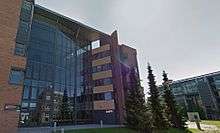Norwegian Centre for Violence and Traumatic Stress Studies
| Nasjonalt kunnskapssenter om vold og traumatisk stress | |
|
| |
| Abbreviation | NKVTS |
|---|---|
| Formation | 2004 |
| Type | Government-owned research institute |
| Location | |
| Fields | Violence and sexual abuse; disaster management, terrorism, armed conflicts and traumatic stress; and forced migration and refugee health |
Director | Inger Elise Birkeland |
Parent organization | University of Oslo |
Staff (2015) | 85[1] |
| Website |
www |
The Norwegian Centre for Violence and Traumatic Stress Studies (Norwegian: Nasjonalt kunnskapssenter om vold og traumatisk stress, NKVTS) is a national, government-owned interdisciplinary research centre in Oslo, Norway. It is part of the University of Oslo, but is established by, funded by and receives its assignments directly from the central government. Its major focus areas are violence and sexual abuse; disaster management, terrorism, armed conflicts and traumatic stress; and forced migration and refugee health.

The centre was established in 2004 through the merger of the former Division of Disaster Psychiatry (KKP) of the Norwegian Armed Forces medical service, the former Psychosocial Centre for Refugees at the University of Oslo (PSSF), the Norwegian Resource Centre for Information and Studies on Violence (VOS), and the Norwegian National Resource Center on Child Sexual Abuse (NRSB).
.jpg)


The centre is a joint initiative of the Ministry of Health, the Ministry of Justice and Public Security, the Ministry of Defence, the Ministry of Labour, and the Ministry of Children, Equality and Social Inclusion, and is funded directly by these government departments while organizationally being part of the University of Oslo. The centre was located at Oslo University Hospital, Ullevål until 2013, and is now located in Nydalen, Oslo, in the immediate vicinity of the Ministry of Justice and Public Security and of the BI Norwegian Business School.
The centre has 85 employees, including 69 researchers (2015). It employs experts in psychology, medicine (including psychiatry and pediatrics), law, sociology, criminology, social anthropology and other disciplines, with the main emphasis on psychology and psychiatry. Its academic staff include research assistants, research fellows (doctoral candidates), postdoctoral fellows, researchers (corresponding to assistant professors), senior researchers (corresponding to associate professors) and research professors (corresponding to full professors). NKVTS cooperates closely with the Department of Psychology, the Faculty of Medicine and the Faculty of Law at the University of Oslo, where several of its research professors also hold professorial chairs.[1]
Nora Sveaass, then head of section for refugee health and forced migration at NKVTS, was elected as a member of the United Nations Committee against Torture in 2005.[2]
NKVTS has major research projects on the psychological and social impact of terrorism, including the 2011 Norway attacks. NKVTS also has several research projects on the psychological impact of natural catastrophes such as the 2004 Indian Ocean earthquake and tsunami, and on child soldiers in Africa, torture, traumatised refugees, war victims and soldiers, child sexual abuse and sexual violence, and violence in close relations.
The current Director of the institute is Inger Elise Birkeland, a former political adviser to Prime Minister Gro Harlem Brundtland.
Notable researchers
- Margunn Bjørnholt, sociologist, Research Professor at NKVTS
- Grete Dyb, psychiatrist, Research Professor at NKVTS and Professor II in child and adolescent psychiatry at the University of Oslo Institute of Clinical Medicine
- Trond Heir, military psychiatrist, Research Professor at NKVTS and Professor II at the University of Oslo Institute of Clinical Medicine
- Tine Jensen, psychologist, Research Professor at NKVTS and Professor of Psychology at the University of Oslo Department of Psychology
- Thore Langfeldt, psychologist, former Senior Researcher at NKVTS
- Inger-Lise Lien, social anthropologist, Research Professor at NKVTS
- Jon-Håkon Schultz, special educationalist, Research Professor at NKVTS and Professor II at the University of Tromsø
- Kristin Skjørten, criminologist, Research Professor at NKVTS and Professor II at the University of Oslo Department of Public and International Law
- Nora Sveaass, psychologist, former Senior Researcher and head of section for refugee health and forced migration at NKVTS, and former member of the United Nations Committee against Torture
- Siri Thoresen, military psychologist, Research Professor at NKVTS
- Odd Arne Tjersland, psychologist, Research Professor at NKVTS and Professor of Clinical Psychology at the University of Oslo Department of Psychology
- Lars Weisæth, military psychiatrist, Research Professor Emeritus at NKVTS and Professor II at the University of Oslo Institute of Clinical Medicine